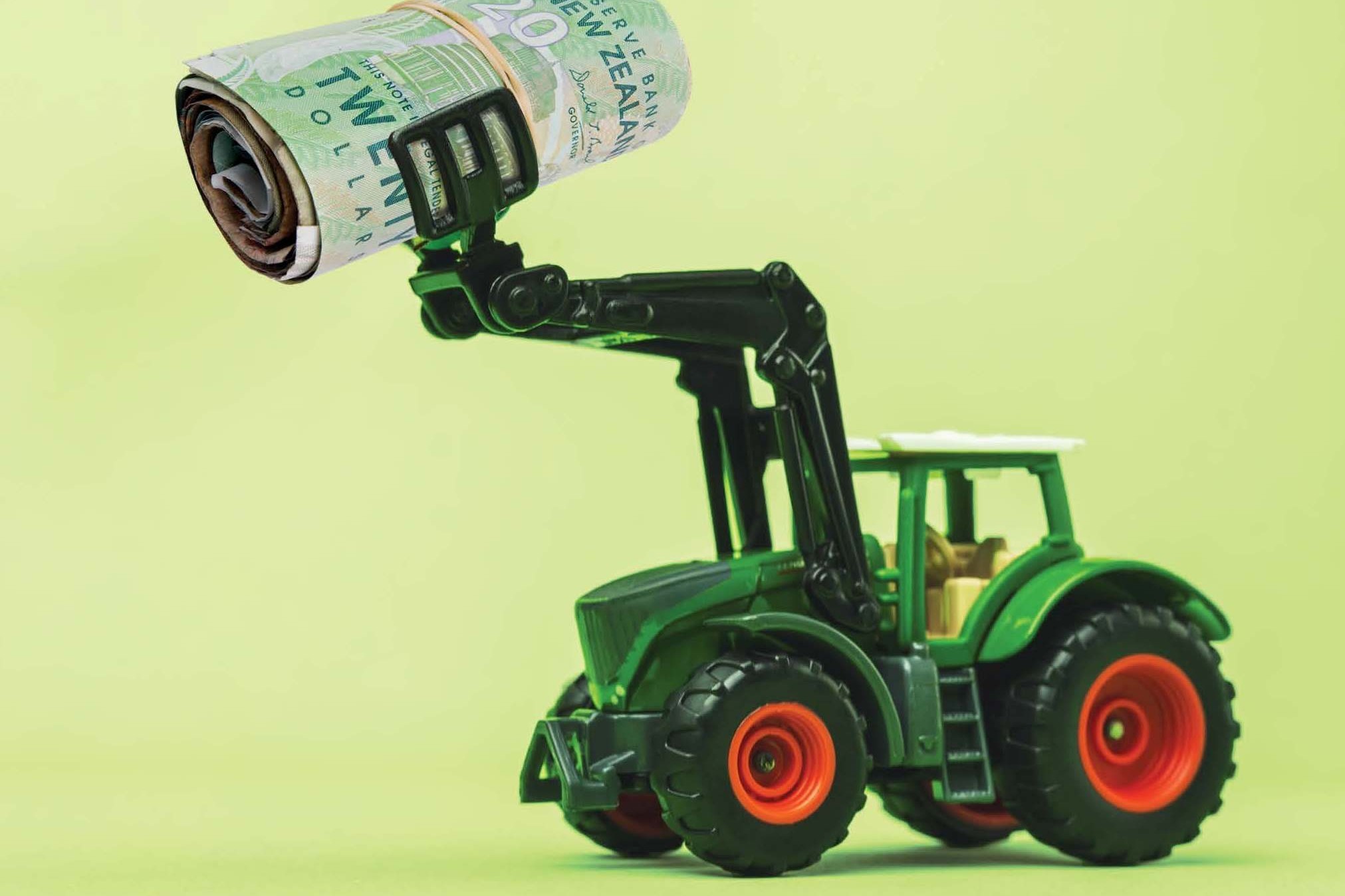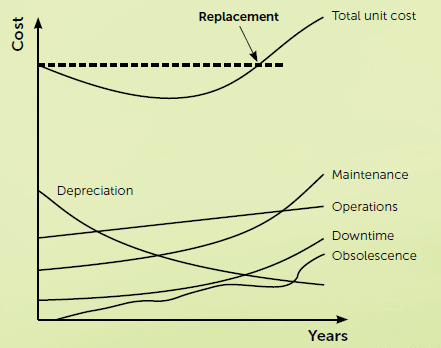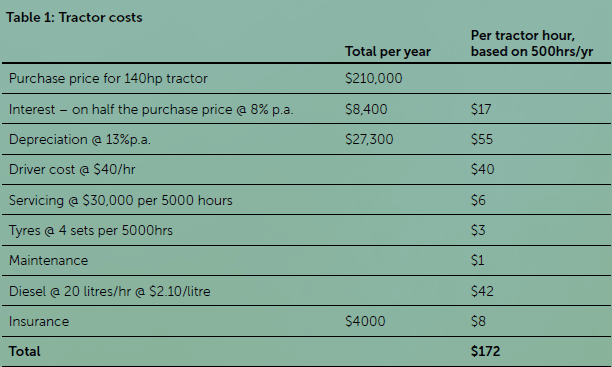Tractor horsepower not cheap
Kerry Dwyer checks out the costs of running a tractor on a farm.

Kerry Dwyer checks out the costs of running a tractor on a farm.
The past three years have seen some changes to our business environment. For example, the cost of buying new tractors that sat at about $1000 a horsepower (hp) for many years, has increased. And the hourly cost of running tractors will have risen also.
The graph shows the cost of operating a vehicle (tractor) over its life. The point marked “replacement” indicates the stage at which the cost of operating the machine is greater than replacing it. This point varies according to the resale value of the machine (sourced from NZTA : Heavy vehicle selection guide).
In doing some research with tractor dealers, servicers and resellers, I find that today’s average farm tractor is about 140hp, and mostly with front-end-loaders. When I started driving tractors the average was maybe 70hp, with 100hp machines being in the “big” category.

For much of this century you could buy a new tractor, with front-end-loader for about $1000/hp, depending on the brand to some extent. We are now looking at about $1500/hp, with some wait time until delivery. For the 140hp tractor you are looking at maybe $210,000, including GST, but to keep things simple we will work with GST-inclusive figures for this analysis. What brand you buy will depend on the balance of the price, quality, service available to you, or maybe simple loyalty to a dealer or brand?
We could assume you buy a new tractor and keep it until it dies, which may be after you. However, we all have different plans of action and ownership and one common plan is to buy new and resell at about 5000 hours, which is maybe the half-life of the tractor. Interestingly, the 5000-hour tractor has a value of about half the equivalent new machine, with some give and take for how you maintain it, and not getting too old in years relative to hours on the clock. As new prices have risen in recent years, second-hand prices have risen proportionately.
Therefore, I will work on buying a new 140hp tractor for $210,000, and selling at 5000 hours at $105,000, and financing the difference to get the next one at the same new price. That may be unlikely with inflation, but is a simple basis to work on. Tractor dealers will have finance deals, but I will use overdraft interest rates of about 8% p.a. for this analysis.
Looking at the second-hand tractors on the market in New Zealand, the average use for 120-140hp tractors is about 500 to 550 hours/year. Contractors will clock more hours than farmers on their tractors, and turn them over more frequently, but farmers are running at about 500 hours/year and reselling near the 5000 hour mark, give or take a bit.

Running time cost
Depreciation will be claimed on the new tractor, at 13% a year over the time you own it. On the $210,000 tractor that comes to $27,000/year. If the tractor does 1000 hours a year that cost is $27/hour running time. If you are the average at 500 hours/year that doubles to $54/hour. If you do 100 hours/year the depreciation equals $270/hour, they are not a great investment sitting idle.
Self-drive tractors are not yet readily available, so you should factor in the cost of sitting either yourself or an employee on the tractor. To sit someone on the minimum wage on a $210,000 machine might not be the best idea, and your time should be more valuable than that also. At $40/hour – an annual salary of $83,000 – which is in the ballpark but to get really good operators you might be looking at more than that.
The tractor will need servicing and each brand has slightly different patterns of service requirements and timing. Some research tells me you are looking at more than $30,000 of service costs for the 5000 hours you have that tractor, at today’s costs, and assuming you are kind to the machine. Treat it badly and costs rise exponentially.
The extra costs
Tyres wear according to the nature of the work, soil and topography you expose it to. Some will get twice the life from a set of tyres compared to others while some tear them apart. The closest I can get to an average is to allow for four sets of tyres over the 5000 hours you own the tractor, which comes to $3/hour.
Some other maintenance expenditure should be allowed for: washdown and cleaning time; wiper blades; refilling the air conditioning; etc. Allow $1/hour minimum.
Diesel costs have fluctuated wildly over the past three years. At one stage producers could hardly sell it, to a time when buyers could hardly buy it. And, you might get a lower price from some suppliers than others depending on location and quantities used.
The amount of fuel used will vary with the type of work done affecting the power requirement, which is highly variable between farms and times of year. The closest I get to an average is 20 litres/hour for a 140hp tractor. At $2.10/litre that comes to $42/hour.
I assume you will have your tractor insured, because $210,000 is quite a hit if it goes on fire with birds nests etc. One insurer advertises they insure about 360,000 tractors in NZ and have about 36 claims per week involving them. That is not a big percentage of claims relative to the number of tractors (0.5%/year) but the implications are high. There is also quite a wide range of insurance costs depending on insurer and the insured, somewhere in the ballpark for this new tractor is $4000/year.
If you own the tractor, do 500 hours/year with an employee on it, the total annual cost is at least $86,000.
Interestingly an industry standard for trucking suggests fuel cost sits at about 11% of total operating cost. Tractors may be outside this, or my figures are too low for the total.
In researching all of this I came across a 2016 article from Pita Alexander who offered three approaches to tractor costs:
Option a). The tractor has an ownership rent of about 40% of new value. The 40% being 15% return on capital plus depreciation of 15% and repairs and maintenance of 10%. On the above that equates to $168/hr, with driver and fuel on top of that.
Option b). Take the resale value off the purchase price to get a “true” depreciation value, add repairs and maintenance and a return on capital of 5%. On the above figures that equates to $57/hour.
Option c). Look at what tractors are available to lease per hour. That is a whole other story so I will leave it for now.
Pita’s figures and mine show that you should take some care in what you buy and how you use it.




